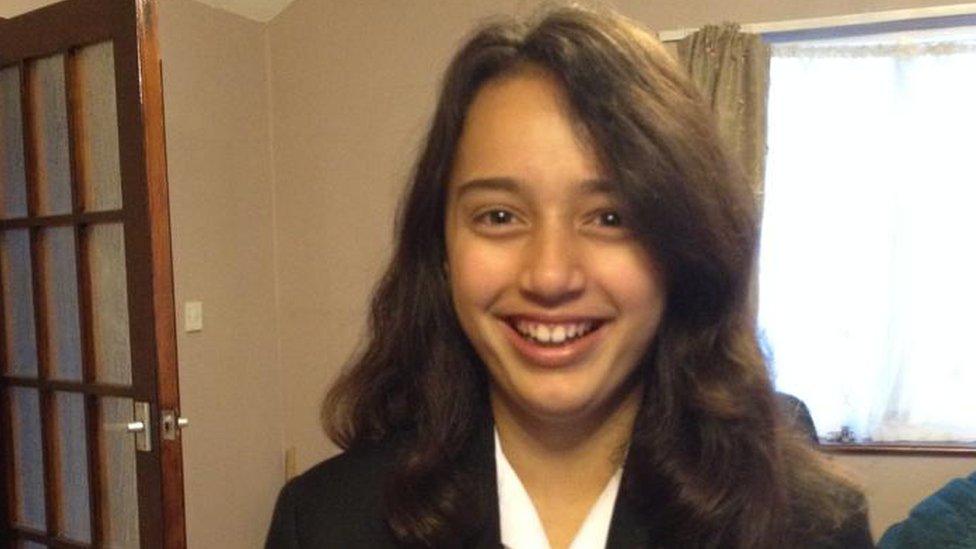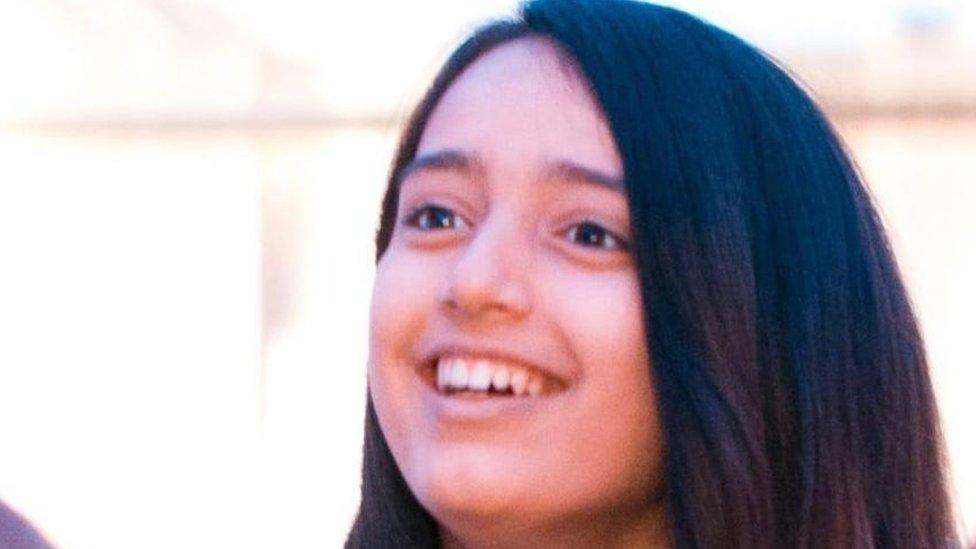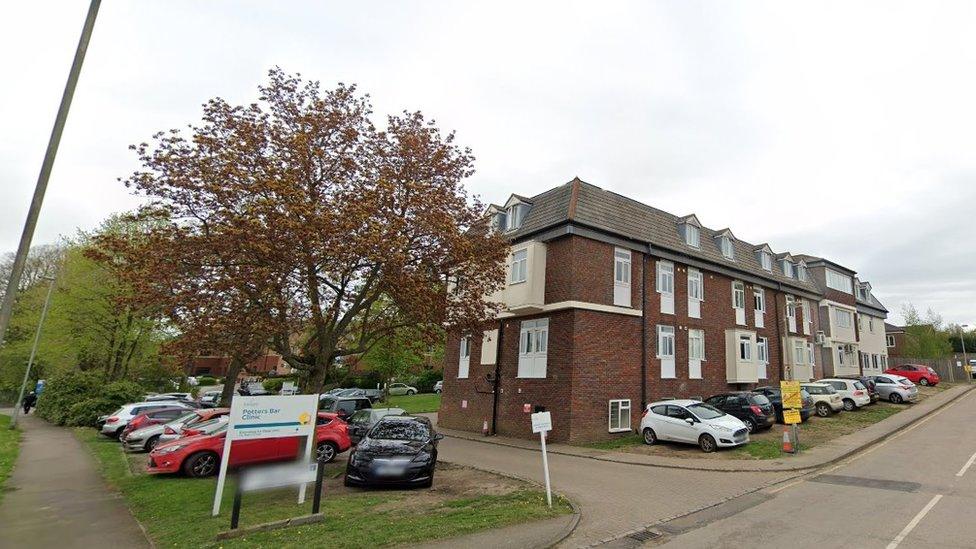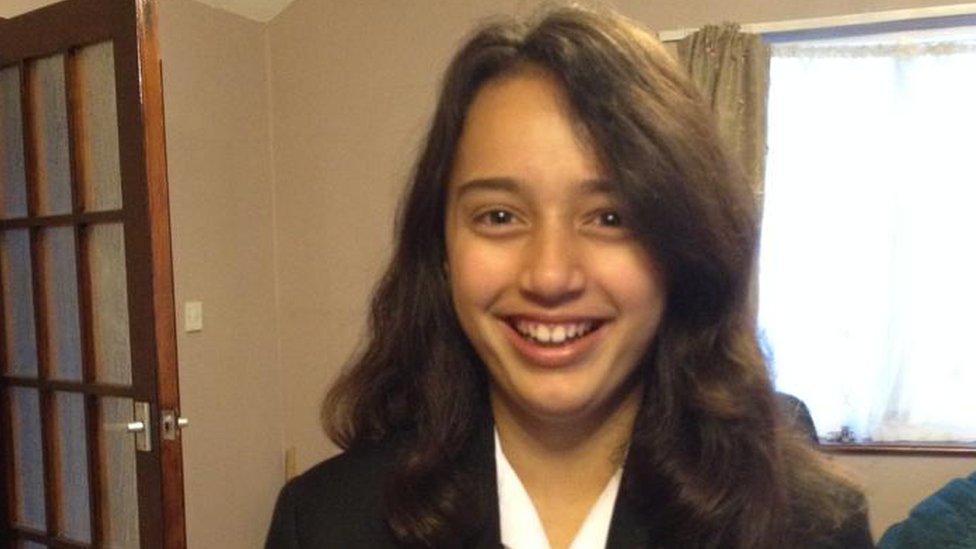Nadia Shah: Cambridgeshire children's services criticised in mental health case
- Published

Nadia Shah was a "beautiful young girl with a heart of gold", her father said
There was an "absence" of agencies working together ahead of the death of a 16-year-old girl who had been at a mental health clinic, a report said.
Nadia Shah, from Cambridge, died while being detained in 2019.
A review, external said numerous referrals were made by NHS teams to Cambridgeshire County Council's children's services, but they were "open and shut".
The council said it had "come a long way since 2019 [and lessons] from her death played a vital role".
Nadia died in January 2019 at Barnet General Hospital, having been in the care of Potters Bar Clinic in Hertfordshire.
Last year, Elysium Healthcare, which runs the clinic, apologised for the "shortcomings in care" after an inquest jury found multiple failures, including issues around observations and Nadia's care plan.
The jury found the teenager, who had complex post-traumatic stress disorder with psychotic features, died by misadventure.
The child safeguarding practice review has since been carried out by the Cambridgeshire and Peterborough Safeguarding Partnership Board, which is made up of the county council, Peterborough City Council, Cambs Police, and Cambs & Peterborough NHS Clinical Commissioning Group.
The review said Nadia first became known to services around the age of 12, and there had then been "intermittent involvement by police and children's social care" with her.
The report also said Nadia had disclosed an allegation that, aged 11 or 12, she and a friend were sexually assaulted in a public space by a group of boys aged between 12 and 18 years old.

Nadia Shah's sister described her as "loyal, brave and selfless"
In a summary of multi-agency working, report author Bridget Griffin said: "The services provided to Nadia and her family were almost entirely provided by community and inpatient child and adolescent mental health services.
"Numerous referrals were made to children's services in an attempt to elicit their involvement but, as put by a panel member, the response by children's services to Nadia and her family was to open and shut, open and shut.
"Nadia's story reflects not just the absence of multi-agency working but also a siloed approach to working with young people with mental ill-health."
The report highlighted one children's services assessment which "lacked depth".
It went on to state: "Of critical importance was that over time a stalemate appeared to be reached - the views of [mental health] clinicians was that Nadia could not go home and was in effect homeless - the view of [county council] children's services was that Nadia had a home with her mother.
"A pattern then emerged throughout the 12 months of inpatient care when discharge was being planned; Nadia's self-harm increased, her aggressive and violent behaviour intensified, and her mental health appeared to significantly deteriorate.
"Ultimately, this led to her admission to a psychiatric intensive care unit."

The Potters Bar Clinic, where Nadia was detained at the time of her death, is run by Elysium Healthcare
Ms Griffin said that during Nadia's inpatient stay she felt unable to return to her mother's care and did not want to remain in inpatient care.
The report's author said: "Nadia's voice was heard by clinicians and practitioners, but this did not result in any tangible changes to Nadia's lived experiences in the areas she wanted most change.
"The question that arises is - why was it so difficult for the multi-agency system to respond?"
'Targeted support'
A county council spokeswoman said the authority fully supported the review's findings, adding: "Significant changes have already been made with partners from the police, the NHS, schools and community groups, to enable us to work together more effectively.
"We are focusing more explicitly on our targeted support for young people, and we now provide more direct intervention and support packages along with our mental health colleagues.
"[The] council is committed to long-term investment in essential early intervention and prevention services so we can help children and young people avoid reaching crisis point in the first place."
Elysium Healthcare said: "There are important lessons for all stakeholders to take away from this review, and to implement, particularly the need for more linked up methods of inter-agency working which places the young person at the heart of all decision making.
"Nadia's death remains a tragedy, and we sincerely hope that her legacy can be an improved mental health system for all young people, across the UK, who are in need of help and support."
Cambridgeshire and Peterborough NHS Foundation Trust, which provides mental health services, has also been contacted for comment.

Find BBC News: East of England on Facebook, external, Instagram, external and Twitter, external. If you have a story suggestion email eastofenglandnews@bbc.co.uk, external
- Published3 November 2021

- Published1 November 2021

- Published18 October 2021
